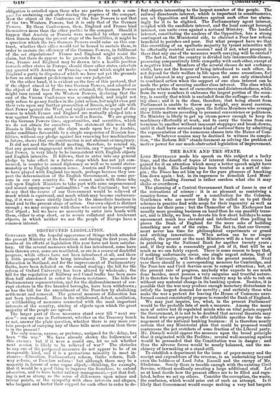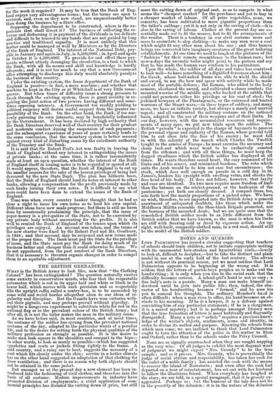THE BANK AND THE STATE.
Lorin MONTEAGLE made his speech on this subject at a lucky time, and the dearth of topics of interest during the recess has gained for it an attention which many a better speech might have failed to find. His Lordship has been treated as a sort of nine- pin ; the Times has set him up for the pure pleasure of knocking him down again : but, in its eagerness to demolish Lord Mont- eagle, the Leading Journal is rather careless what else it may shake or overthrow.
The planning of a Central Government Bank of Issue is one of the recreations of science : it is as pleasant as contrivin& a country-house for oneself or a constitution for the Colonies. Gentlemen who are never likely to be called on to put their schemes in practice find wide scope for their ingenuity as well as exercise for their pens : but the Chancellor of the Exchequer has usually, more pressing business on hand than he can possibly trans- act, and is likely, we fear, to devote his few short holidays to some amusement much less elevated and intellectual than pulling to pieces the Bank of England for the mere sake of building something new out of the ruins. The fact is, that our Govern- ment never has time for philosophical experiments or grand and striking innovations. When action can be no longer delayed, the present or the next Ministers will do a turn of work in patching up the National Bank for airther twenty years ; and, if they make a reasonably good job of it, that will be as much as we can fairly expect. There is some reason to hope that, if nothing unfortunate occur, one single urgent reform, that of Oxford University, will be effected in the present session. Next year there should be a corresponding measure for Cambridge, and the Poor-law and Civil Service seem to compel attention; but, at the present rate of progress, anybody who expects to see much done besides, must possess a very sanguine and trustful nature. It is therefore to be hoped that the country may be able to rub on without any material change in its banking system. Besides, it is possible that the war may produce enough monetary disturbance to satisfy the largest demand for novelty ; and certainly those who make the war a pretext for leaving the House of Commons unre- formed cannot consistently propose to remodel the Bank of England.
We may just inquire, too, what, in the present Parliament' would be the probable fate of such a measure. Among the many men of active but ill-regulated minds who on vital points support the Government, it is not to be doubted that several theorists may be found who are prepared to offer infallible specifics for the ma- nagement of the national banking business : it is therefore nearly certain that any Ministerial plan that could be proposed would contravene the pet crotchets of some fraction of the Liberal party. Mr. Disraeli would oppose the measure upon the broad principle that it originated with the Peelites; several well-meaning squires would be persuaded that the Constitution was in danger ; and thus the adverse forces would be nearly balanced, and the ma- chinery of lawmaking at a stand-still. To establish a department for the issue of paper-money and the receipt and expenditure of the revenue, is an undertaking beyond even the boldness of Lord John Russell and the energy of Mr. Gladstone. Surely there is trouble enough with the existing Civil Service, without needlessly creating a large additional staff. Let us at least decide how the present offices are to be filled and regu- lated, before we set up others. Consider the corruption, the waste, the confusion, which would arise out of such an attempt. Is it likely that Government would escape making a very bad bargain for the work it required? It may be true that the Bank of Eng- land enjoys very advantageous terms ; but the terms are open to revision, and, even as they now stand, are unquestionably better than doing the business by a State office.
Supposing the department to be constructed, where is the ex- perience that shall direct it ? The business of collecting the re- venue and disbursing it in payment of the dividends is too delicate and difficult to be trusted to any hands that are not guided by long practice and traditional sagacity. It is most unlikely that this matter could be managed as well by Ministers as by the Directors of the Bank of England. The interest of the National Debt, pay- able in January and again in July, is 8,500,000/. ; in April and again in October it is 4,500,000/. To provide for and effect these pay- ments without utterly deranging the circulation, is a task to which the Bank, with all its means and skill and knowledge is hardly adequate; and it is not too much to say that a new Government office attempting to discharge this duty would absolutely paralyze the business of the country.
Under the existing system, the Issue department of the Bank of England is passive—in fact, a mere machine ; and whether that machine be kept in the City or at Whitehall is of very little conse- quence. But when times of difficulty cause a strong pressure to break through the existing system, there is great security in re- quiring the joint action of two powers having different and some- times opposing interests. A Government too readily yielding to political exigency will derive useful support from the greater im- passibility of the Bank. On the other hand, the Bank, if too nar- rowly pursuing its own interests, may be beneficially influenced by the Government. It has been declared by high authority that the Bank Directors deserved well of their country for their prudent and moderate conduct during the suspension of cash payments ; and the subsequent experience of years of peace certainly tends to the same conclusion, that the monetary system is better secured against every kind of disturbing cause by the coordinate authority of the Treasury and the Bank. It is said that Sir Robert Peel's Act was faulty in leaving the Bank of England without any interest in extinguishing the issues of private banks; at the same time, it is rather inconsistently made at least an open question, whether the interest of the Bank of England itself in issuing notes is to be regarded or spared at all. It would appear, therefore, that the Bank of England is to eat up the smaller issuers for the sake of the barren privilege of being last devoured by the new State Bank. The plan has hitherto been, that the Bank of England should lend its notes at interest to other banks, allowing a compensation for the profit previously made by such banks issuing their own notes. It is difficult to see what more could have been done to extend the issues of the Bank of England.
Time was when every country banker thought that he had as clear a right to issue his own notes as to lend his own capitaL Different ideas have now made progress; but there is still no harm done by occasionally proclaiming the principle, that the issue of paper-money is a prerogative of the State, not to be exercised by any private body without accounting for the profits. It is also well to remind the Bank of England of the tenure upon which its privileges are enjoyed. An account was taken, and the terms of the new charter were fixed by Sir Robert Peel and Mr. Goulburn, in 1844; and that account may be reopened and new terms made at the proper time. The Bank must pay the State for the privilege of issue, and the State must pay the Bank for doing much of its business better and cheaper than it could otherwise be done. We do not apprehend, from the past conduct of the Bank Directors, that it is necessary to threaten organic changes in order to compel them to an equitable adjustment.



























 Previous page
Previous page